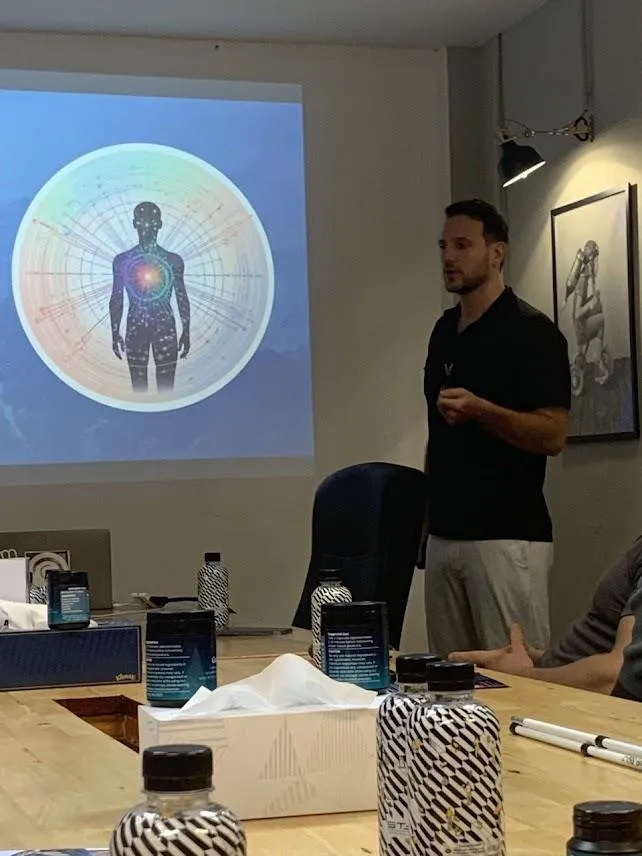Do you have a calling?
Are you looking for yourself?
Henosis is founded upon the idea that every human being in unique and has a purpose. You have aspects that make you so different to every other human on the planet, yet such deep similarities that show we're all the same.
Origin Story of Henosis
The Greek word henosis refers to the process of achieving a state of oneness or unity with the divine. This concept has been central to many mystical and philosophical traditions throughout history, particularly in ancient Greece.
The term henosis comes from the Greek word ἕνωσις, which means "union" or "merging." It was used by several ancient Greek philosophers, including Plotinus and Proclus, to describe the goal of mystical practice.
For these philosophers, the goal of mystical practice was to transcend the limitations of the physical world and achieve a direct experience of the divine.
This experience was seen as a merging or union with the divine, a state of consciousness in which the individual and the divine were no longer separate entities but were united as one.
In some mystical traditions, henosis was seen as a gradual process of spiritual development, in which the individual gradually purifies their mind and body and becomes more attuned to the divine. In others, it was seen as a sudden, spontaneous experience that could occur at any time.
The concept of henosis was also central to many ancient Greek religious practices, particularly in the mystery religions. These were secretive, initiatory cultures that focused on the direct experience of the divine through ritual practices, often involving ecstatic states of consciousness.
Henosis has also been an important concept in the history of Christianity, particularly in the Eastern Orthodox tradition. In this tradition, henosis is seen as the ultimate goal of spiritual practice, a state of union with God that is achieved through prayer, contemplation, and asceticism.

Overall, the concept of henosis is a complex and multifaceted one that has played a central role in many mystical and philosophical traditions throughout history. Whether seen as a gradual process of spiritual development or a sudden, spontaneous experience, it represents the human longing for a direct experience of the divine, and the recognition that this experience lies at the heart of our deepest aspirations and desires.

HENOSIS PURPOSE
Henosis was formed to hold space for the lost soul, questioning their current reality, and to provide alternative information and experiences that may serve as the launching pad for their new life.

HENOSIS VISION
We believe that all humans deserve to live a life of fulfillment and to participate in the raising of the vibrational frequency of earth to expand consciousness.

HENOSIS MISSION
Henosis assists with the shedding of our limiting beliefs, overcoming our emotional and energetic blocks and reprogramming harmful habits and biases. We develop educational information, events and activities to promote ancient wisdom, alternative medicines, new age science and holistic healing modalities to empower the individual to discover their own limitless possibilities and increase awareness.
What the greats say about Henosis over Millenia
Within the word henosis lies a powerful invitation to experience the unity and oneness that exists within and around us, to dissolve the illusion of separateness and awaken to the truth of our interconnectedness with all of life.
Plato
Henosis is the transcendence of the self, the merging of the individual with the divine, and the attainment of spiritual enlightenment.
Eckhart Tolle
The experience of henosis is a mystical journey, a quest for the ultimate truth and the ultimate reality.
Carl Jung
In the state of henosis, the individual ego dissolves into the infinite, and the soul merges with the divine.
Deepak Chopra
Henosis is the realisation that we are all interconnected, that we are all part of a greater whole, and that we are all one.
Alan Watts
In the state of henosis, the boundaries between self and other dissolve, and the individual becomes one with the universe and all that exists.
Sri Ramana Maharshi
Henosis is the state of being in which one transcends the limitations of the ego and realises the true nature of the self as part of the divine.
Buddha
Henosis is the ultimate liberation, the release from the bonds of the ego and the attainment of eternal bliss and peace.
Henosis
Henosis represents the journey of transcending individuality, merging with the divine, and awakening to the unity that connects all of existence.
Interested in changing your life?
Check out some of our free articles
HEALTH & WELLBEING

The Power of Emotional Mastery: Controlling Negative Emotions and Society’s Pressure on Emotional Norms
Emotional mastery is the ability to regulate and manage one's emotions. It involves taking responsibility for your feelings and controlling your reactions to them. The duration of an emotion is determined by the individual and not external circumstances. Society also plays a role in establishing emotional norms that can be a threat to individual freedom of feeling and thinking. In this article, we will explore the necessity of negative emotions, the power we have over them, and how societal expectations can affect emotional regulation.
The Awareness of Negative Emotions
Maintaining emotional balance is crucial to overall well-being, and this includes acknowledging negative emotions. Trying to suppress negative emotions altogether is not a reliable solution. The dystopian society depicted in Aldous Huxley's novel “Brave New World” is an example of the dangers of eliminating negative emotions. In the novel, a drug called “soma” is used to block out emotions resulting from stressful situations such as pain, grief, and anger. This “painless” society described in the novel greatly reflects how people become mindless flocks, without any ambition or ideals, only living for pleasure. However, solely focusing on the pain is not a reliable solution as well. There is merit in allowing even the negative emotions to surface, and letting them move through us, with the goal of not reacting to them, followed by our conscious decision to express, release or change them.
The Power of Individual Regulation of Emotions
We have the power to regulate our emotions. We can choose how long we want to feel a certain way and how we react to our emotions. This is a fundamental aspect of emotional mastery. We can control how we feel, and this ability gives us control over our lives. For example, if we feel angry, we can choose to act on that emotion or take a step back and process it before reacting. We can also choose to focus on positive emotions, such as joy, and use them as a source of motivation and inspiration.
Society's Pressure on Emotional Norms
Society's expectation of emotional norms can be a threat to individual freedom of feeling and thinking. The expectation that individuals should feel sadness about certain life events, such as breakups or loss of loved ones, can be harmful. These life events do not necessarily have to be sad for every single person, as a breakup can mean a new and better beginning, the loss of a loved one can mean peace in the afterlife (for the spiritual readers), or a team member leaving means an opening for what the company required all along.
Although, the pressure of societies predetermined emotions “required” for such life events, if one does not respond to society's presupposition can be seen as thoughtless, cold-blooded or unemotional. This can lead to a form of pressure to show sadness or anger to 'show' that you do care.

Take a deep breath and be grateful to be alive. It is one of the easiest ways to control your emotions
The reason why we shouldn't respond in hatred, anger or sadness during a heated event, such as a break-up, a building burning down or a catastrophe in our personal life, is because the reason behind such events is hidden from us at the time. An old Chinese proverb, “We’ll See” illustrates how the perception of an event can change over time. By accepting situations as they are and not reacting to them, we can learn valuable lessons to help us on our life journey. When we take responsibility for our emotions, we can see that life happens for us, not to us, and we can appreciate every moment as a gift.
Conclusion
Emotional mastery is a crucial life skill that involves regulating and managing one's emotions. Negative emotions are a natural part of life, and it is important to acknowledge and process them. We have the power to regulate our emotions, and this gives us control over our lives. Society's expectations of emotional norms can be a threat to individual freedom of feeling and thinking. By accepting situations as they are, we can learn valuable lessons and appreciate every moment as a gift. Emotional mastery takes time and practice, but it is a skill worth mastering.
Sources
Huxley, A. (1932). Brave New World. Chatto & Windus.
Salovey, P., Mayer, J. D., Goldman, S. L., Turvey, C., & Palfai, T. P. (1995). Emotional attention, clarity, and repair: Exploring emotional intelligence using the Trait Meta-Mood Scale. In J. W. Pennebaker (Ed.), Emotion, disclosure, and health (pp. 125
PSYCHOLOGY

The Power of Emotional Mastery: Controlling Negative Emotions and Society’s Pressure on Emotional Norms
Emotional mastery is the ability to regulate and manage one's emotions. It involves taking responsibility for your feelings and controlling your reactions to them. The duration of an emotion is determined by the individual and not external circumstances. Society also plays a role in establishing emotional norms that can be a threat to individual freedom of feeling and thinking. In this article, we will explore the necessity of negative emotions, the power we have over them, and how societal expectations can affect emotional regulation.
The Awareness of Negative Emotions
Maintaining emotional balance is crucial to overall well-being, and this includes acknowledging negative emotions. Trying to suppress negative emotions altogether is not a reliable solution. The dystopian society depicted in Aldous Huxley's novel “Brave New World” is an example of the dangers of eliminating negative emotions. In the novel, a drug called “soma” is used to block out emotions resulting from stressful situations such as pain, grief, and anger. This “painless” society described in the novel greatly reflects how people become mindless flocks, without any ambition or ideals, only living for pleasure. However, solely focusing on the pain is not a reliable solution as well. There is merit in allowing even the negative emotions to surface, and letting them move through us, with the goal of not reacting to them, followed by our conscious decision to express, release or change them.
The Power of Individual Regulation of Emotions
We have the power to regulate our emotions. We can choose how long we want to feel a certain way and how we react to our emotions. This is a fundamental aspect of emotional mastery. We can control how we feel, and this ability gives us control over our lives. For example, if we feel angry, we can choose to act on that emotion or take a step back and process it before reacting. We can also choose to focus on positive emotions, such as joy, and use them as a source of motivation and inspiration.
Society's Pressure on Emotional Norms
Society's expectation of emotional norms can be a threat to individual freedom of feeling and thinking. The expectation that individuals should feel sadness about certain life events, such as breakups or loss of loved ones, can be harmful. These life events do not necessarily have to be sad for every single person, as a breakup can mean a new and better beginning, the loss of a loved one can mean peace in the afterlife (for the spiritual readers), or a team member leaving means an opening for what the company required all along.
Although, the pressure of societies predetermined emotions “required” for such life events, if one does not respond to society's presupposition can be seen as thoughtless, cold-blooded or unemotional. This can lead to a form of pressure to show sadness or anger to 'show' that you do care.

Take a deep breath and be grateful to be alive. It is one of the easiest ways to control your emotions
The reason why we shouldn't respond in hatred, anger or sadness during a heated event, such as a break-up, a building burning down or a catastrophe in our personal life, is because the reason behind such events is hidden from us at the time. An old Chinese proverb, “We’ll See” illustrates how the perception of an event can change over time. By accepting situations as they are and not reacting to them, we can learn valuable lessons to help us on our life journey. When we take responsibility for our emotions, we can see that life happens for us, not to us, and we can appreciate every moment as a gift.
Conclusion
Emotional mastery is a crucial life skill that involves regulating and managing one's emotions. Negative emotions are a natural part of life, and it is important to acknowledge and process them. We have the power to regulate our emotions, and this gives us control over our lives. Society's expectations of emotional norms can be a threat to individual freedom of feeling and thinking. By accepting situations as they are, we can learn valuable lessons and appreciate every moment as a gift. Emotional mastery takes time and practice, but it is a skill worth mastering.
Sources
Huxley, A. (1932). Brave New World. Chatto & Windus.
Salovey, P., Mayer, J. D., Goldman, S. L., Turvey, C., & Palfai, T. P. (1995). Emotional attention, clarity, and repair: Exploring emotional intelligence using the Trait Meta-Mood Scale. In J. W. Pennebaker (Ed.), Emotion, disclosure, and health (pp. 125
HAPPINESS

The Power of Emotional Mastery: Controlling Negative Emotions and Society’s Pressure on Emotional Norms
Emotional mastery is the ability to regulate and manage one's emotions. It involves taking responsibility for your feelings and controlling your reactions to them. The duration of an emotion is determined by the individual and not external circumstances. Society also plays a role in establishing emotional norms that can be a threat to individual freedom of feeling and thinking. In this article, we will explore the necessity of negative emotions, the power we have over them, and how societal expectations can affect emotional regulation.
The Awareness of Negative Emotions
Maintaining emotional balance is crucial to overall well-being, and this includes acknowledging negative emotions. Trying to suppress negative emotions altogether is not a reliable solution. The dystopian society depicted in Aldous Huxley's novel “Brave New World” is an example of the dangers of eliminating negative emotions. In the novel, a drug called “soma” is used to block out emotions resulting from stressful situations such as pain, grief, and anger. This “painless” society described in the novel greatly reflects how people become mindless flocks, without any ambition or ideals, only living for pleasure. However, solely focusing on the pain is not a reliable solution as well. There is merit in allowing even the negative emotions to surface, and letting them move through us, with the goal of not reacting to them, followed by our conscious decision to express, release or change them.
The Power of Individual Regulation of Emotions
We have the power to regulate our emotions. We can choose how long we want to feel a certain way and how we react to our emotions. This is a fundamental aspect of emotional mastery. We can control how we feel, and this ability gives us control over our lives. For example, if we feel angry, we can choose to act on that emotion or take a step back and process it before reacting. We can also choose to focus on positive emotions, such as joy, and use them as a source of motivation and inspiration.
Society's Pressure on Emotional Norms
Society's expectation of emotional norms can be a threat to individual freedom of feeling and thinking. The expectation that individuals should feel sadness about certain life events, such as breakups or loss of loved ones, can be harmful. These life events do not necessarily have to be sad for every single person, as a breakup can mean a new and better beginning, the loss of a loved one can mean peace in the afterlife (for the spiritual readers), or a team member leaving means an opening for what the company required all along.
Although, the pressure of societies predetermined emotions “required” for such life events, if one does not respond to society's presupposition can be seen as thoughtless, cold-blooded or unemotional. This can lead to a form of pressure to show sadness or anger to 'show' that you do care.

Take a deep breath and be grateful to be alive. It is one of the easiest ways to control your emotions
The reason why we shouldn't respond in hatred, anger or sadness during a heated event, such as a break-up, a building burning down or a catastrophe in our personal life, is because the reason behind such events is hidden from us at the time. An old Chinese proverb, “We’ll See” illustrates how the perception of an event can change over time. By accepting situations as they are and not reacting to them, we can learn valuable lessons to help us on our life journey. When we take responsibility for our emotions, we can see that life happens for us, not to us, and we can appreciate every moment as a gift.
Conclusion
Emotional mastery is a crucial life skill that involves regulating and managing one's emotions. Negative emotions are a natural part of life, and it is important to acknowledge and process them. We have the power to regulate our emotions, and this gives us control over our lives. Society's expectations of emotional norms can be a threat to individual freedom of feeling and thinking. By accepting situations as they are, we can learn valuable lessons and appreciate every moment as a gift. Emotional mastery takes time and practice, but it is a skill worth mastering.
Sources
Huxley, A. (1932). Brave New World. Chatto & Windus.
Salovey, P., Mayer, J. D., Goldman, S. L., Turvey, C., & Palfai, T. P. (1995). Emotional attention, clarity, and repair: Exploring emotional intelligence using the Trait Meta-Mood Scale. In J. W. Pennebaker (Ed.), Emotion, disclosure, and health (pp. 125

